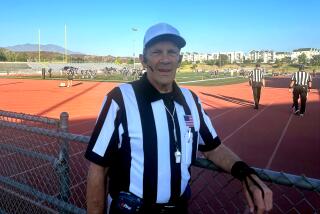Changes will make NFL umpires’ jobs tougher
- Share via
For NFL umpires, safety comes at a cost.
They will be out of the line of fire — moving from the middle of the defense to several yards behind the quarterback — but their job won’t be any easier. In many ways, it will be harder.
“This is a radical change,” said retired field official Ron Botchan, widely regarded as the best umpire in NFL history. “It’s going to take some adjusting. But the owners wanted it, the competition committee wanted it, and it’s their ball, man.”
Botchan, now an officiating supervisor with a special understanding of how difficult this change will be, is confident league umpires will iron the wrinkles in the revamped system. But it will also take some serious adjusting.
Among the changes and challenges:
• Get ready to run — Umpires are responsible for setting the ball to be snapped. That wasn’t a problem when they were five yards deep on the defensive side. Now, however, they will be 15 yards deep on the offensive side, so they will be constantly sprinting forward and backpedaling out of the picture. That’s tougher than it sounds.
“If it’s a hot game, after three or four runs up the middle, some guys are going to be dragging,” Botchan said.
• Get out of the way — Botchan and others predict that teams that like to run hurry-up offenses could be frustrated by the time it takes to set the ball and for the official to get out of the way.
In the final two minutes of each half, the umpire will return to his traditional spot in the middle of the defense as not to interrupt the flow of a fast-moving game.
• Win some, lose some — Monitoring the conduct of the offensive and defensive lines is an umpire’s main responsibility, and the new position will make that easier and tougher. Good news for defensive linemen: Offensive holding will be more obvious, but defensive holding — and those outlawed pre-snap flinches by defensive linemen — will be harder to spot.
Umpires won’t be there to peel back piles or break up fights as quickly. Also, they used to be a huge help in determining whether receivers trapped or caught passes. Now, the umpires will usually be too far away to tell.
• Get used to the change — Many umpires are former college linebackers, so they felt at home in their old position on the field. (Botchan even spent a few years in the pros.) That old model of umpire — stout and sturdy — probably isn’t going to work anymore because of all the running. And you can expect colleges to follow the NFL’s lead.
“I’m not guaranteeing anything, but I’ve talked to two or three [college] conferences that are going to flip over to the new way,” Botchan said. “They’re going to be looking for umpires who can really run.”
Haynesworth situation is no surprise
After a week of warring with Redskins Coach Mike Shanahan — and failing multiple conditioning tests — defensive tackle Albert Haynesworth told NBC4 in Washington: “I’m tired of this B.S. I just want to get out on the field and play football.” The whole affair has become a major distraction, which comes as no surprise to some people.
Former Jets and Chiefs coach Herm Edwards, for one, predicted this type of mess a few weeks ago when speaking at the NFL 101 event in Los Angeles.
“ Jeff Fisher is a smart football coach,” Edwards said, referring to the coach who allowed Haynesworth to leave the Tennessee Titans. “The Titans did not want Albert Haynesworth back. There’s a reason for that. Jeff Fisher didn’t just wake up one day and say, ‘Oh, by the way, we’re going to get rid of him.’
“He dealt with this guy for so many years and said, ‘You know what? Enough is enough. I’m tired of a guy that’s a good player for about 10 games.’ Doesn’t play all 16 — hurt, something’s going to happen, he’s going to be disgruntled…”
Edwards said it’s easy to pile the blame on Haynesworth, but only if you ignored all the buyer-beware warning signs.
“You get a choice: Do you want this guy?” he said. “Because when you pick him on your football team, that’s the baggage he brings.
“We can get mad at the player all we want. But the problem is, when you keep paying the player for acting that way, and you don’t do anything to make him understand that we don’t operate that way, guess what? He thinks he’s entitled to do it.”
More to Read
Go beyond the scoreboard
Get the latest on L.A.'s teams in the daily Sports Report newsletter.
You may occasionally receive promotional content from the Los Angeles Times.











